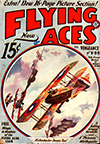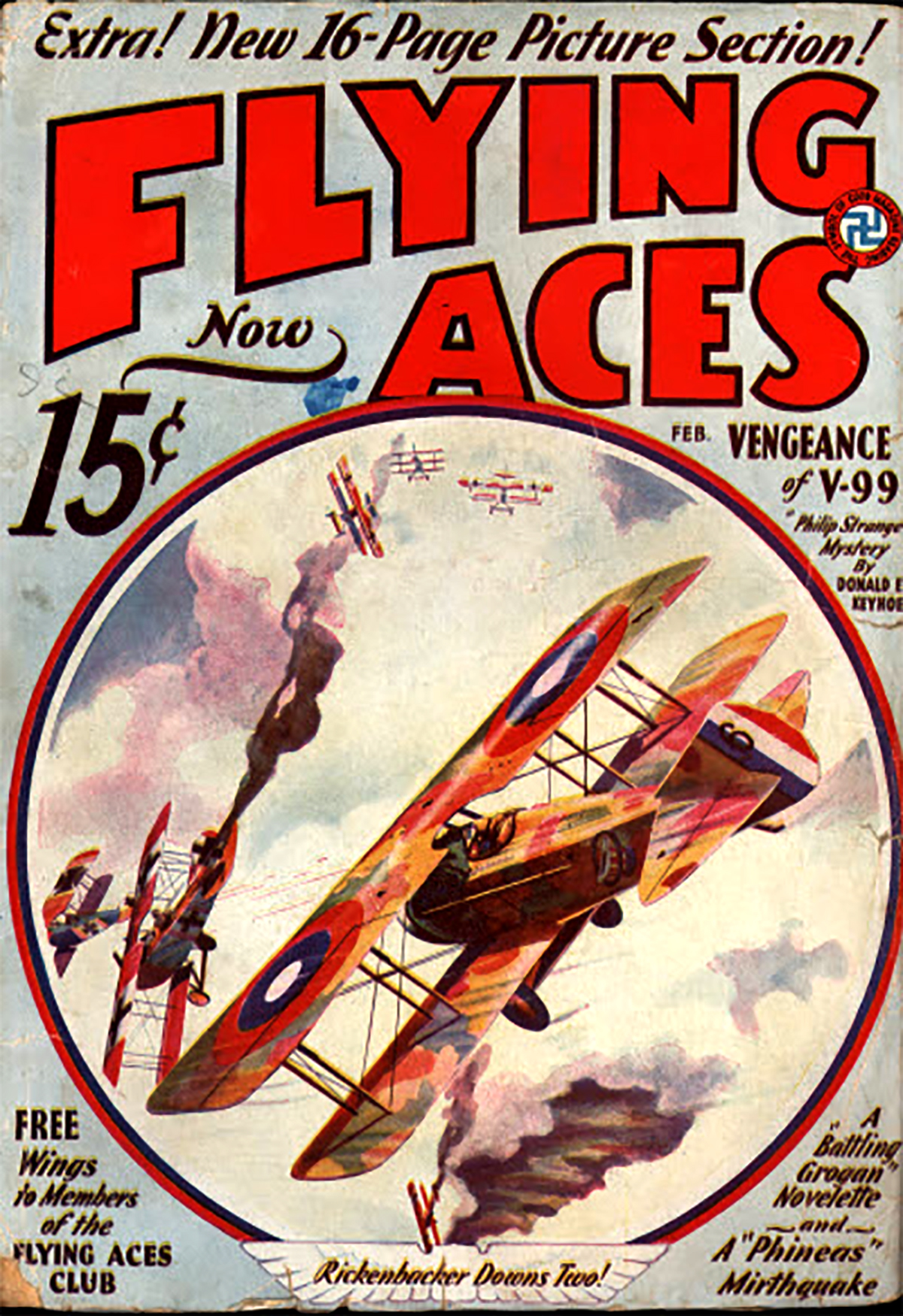“Rickenbacker Downs Two” by Paul Bissell
THIS week we present another of Paul Bissell’s covers for Flying Aces! Bissell is mainly known for doing the covers of Flying Aces from 1931 through 1934 when C.B. Mayshark took over duties. For the February 1933 cover Bissell put us right in the action as
Rickenbacker Downs Two
 “Sure he can fly, I’ll hand him that. But what’s the idea of making us hang around on the ground? We don’t come to this flyin’ school nowadays to watch exhibition flyin’.â€
“Sure he can fly, I’ll hand him that. But what’s the idea of making us hang around on the ground? We don’t come to this flyin’ school nowadays to watch exhibition flyin’.â€
“Oh, well, some guys get all the gravy,†and the speaker petulantly kicked a hole in the turf of the flying field. “Probably he’s somebody’s bright boy whose daddy gave him his own plane. Pretty soft, I call it. What do you say, Sarge?â€
The man thus addressed was much older than the students and was evidently in charge of them. He was a hard-bitten mechanician and evidently an ex-army man.
“Soft!†he exclaimed scornfully. “You damned babies make me sick. Say, don’t you know who that guy was?â€
“I don’t see that it matters a damn who he was,†spoke up one youngster. “We’re here to learn to fly and—â€
“Oh, you don’t, don’t you?†and this time the sergeant’s voice was hard. “Well, get this, youngster. There are certain men who’ve done things for their country that you can’t pay for in dollars and cents, see? You—and I mean everybody in the country—can just try to give them a little courtesy and special treatment whenever you get a chance to, and be damned glad for the chance.
“If we was in the army, you know what I’d ’a’ done, don’t you? I’d ‘a’ marched every damned one of you out on that field and kept you at attention the whole time he was here so that the next time you’d know a good man when you saw him. Say, don’t you guys know who that feller was?†The sergeant’s tone was one of complete exasperation that such ignorance could exist.
“No? Then listen, buzzards. I’m goin’ to tell you a true bedtime story. Once upon a time when you babies were still wearing didies there was a war. Maybe you never heard of it, what with peace societies and all those sort of things these days, but, everything considered, it was quite a little war at that. Now I was sort of young and foolish about then, and seeing a nice poster displayed ’bout how you could join the air service and learn to fly, I goes in and lets them take my fingerprints. I guess that was a mistake. They must’ve read my palm or something at the same time and decided I was an advance model of you birds and never would learn to fly, so they didn’t even try to teach me. But anyway, they sent me over with a squadron to see that the Frogs didn’t get any vin rouge by mistake into the gas tanks ’stead o’ gas.
“The outfit I finally pulls up with was the 94th Squadron. I s’pose you ain’t never heard of the 94th, eh? Guess they just omitted mentionin’ that at your schools. Well, believe me, the Germans knew about the 94th, and when they saw a ship with old Uncle Sam’s hat with a ring around it painted on the sides, they knew that hell was going to be poppin’ loose in just about a minute. That was the first real Yank squadron to cross the Front. Ninety-one Germans they got before the show was over. Americans, every damned one in the 94th. And the guy that just went off in that limousine was the boy that led them through the last lap.
“PRETTY soft, you said, didn’t you, Buck?†And he spat scornfully to one side as he squinted at the embarrassed youngster in front of him. “Well, it wasn’t always soft. Once before I saw him come out on the field, sort of like today, only dif’rent. He was a captain then, and it wasn’t a limousine, but a damned poor motorcycle and side-car, with the corporal sittin’ in the side-car, holding on like he was in a rollercoaster, and the captain tearin’ across the field like he was tryin’ to hang up another speed record.
“It was the day he took charge of the squadron, and he was just hell bent to get up and get himself a Boche. We were just outside of Toul then, and the Germans were damned fresh in that sector, so he didn’t have to look very hard before he located two observation crates quietly gettin’ in their work with five Fokkers playin’ nurse to ’em up in the clouds. Right then the captain started climbin’. The old game—up into the sun.
“Maybe they would see him, and then maybe—well, anyway they didn’t. And he got just where he wanted to, sittin’ up on the last German’s tail with the sun square behind him.
“You ain’t ever seen a Spad dive, buddies, have you? Well, we used to call them the ‘flyin’ bricks’ over there, and when you turn one over on its nose and give her the gun, she moves so fast she damn near catches up with the bullets out of her own guns. And that’s the way the captain went down at that first German. The poor Fritzie didn’t have a chance. Here was the captain lettin’ both guns go, and comin’ down right behind the bullets themselves.
“The bullets must’ve beat the Spad a little, at that, ’cause the Fokker started spoutin’ smoke and slipped off sort of cockeyed, headin’ for the ground, just as the captain and his Spad dived by and right through the whole formation. Then a zoom, and he was back above them again, hangin’ on his prop, lookin’ them over. Fritzie must’ve thought there was another dozen or two comin’ behind him, because they got their wind up and broke.
“Quick as a flash the captain kicked his rudder over, shot his stick to neutral, and down he dropped like God’s judgment on the two L.V.G.s below. They saw him comin’, and the gunners were plenty ready for him, too. Hell’s bells, how they peppered him! I know, ’cause I helped to put the patches on when he got back. But none of those pills landed where it hurt, and before those Fritzies could turn or twist, he was past them, and zooming back for another crack at them.
“The other Jerries had got their nerve back by now and were divin’ in. It had to be a quick job, and the captain knew it. He slipped the bus off on a wing, and, holding her in the slip, slowly eased his nose around until he had both the two-seaters in range at the same instant. Then he cut loose, both guns pumpin’. You could see the tracers zippin’ through the air and buryin’ themselves in the Jerry machines.
“It was a queer spot the captain was in, and a couple of seconds was all he could hold it. But he had the Boche dead on the spot, and these seconds were plenty. The nearest ship tailed up and a couple of German aviators were just German heroes. The other Jerries seemed sort of discouraged, too. They weren’t crowdin’ any more, but had gone into a huddle around the photo-bus, and all were headin’ for the Vaterland.
“Gas and ammo were about out, so the captain came on in. Two minutes—two Germans. Not bad, eh? Well, he got twenty-five before that mess was over, and waded through a hundred bits of hell to get them.
“Soft!†The sergeant spat disgustedly into the dust again. “You birds weren’t close to him, were you? You didn’t see that little blue bar he wears with the silver stars on it? Well, you probably wouldn’t have recognized it, anyway. They ain’t many of them around. Maybe you don’t even know what it means—maybe you don’t know yet who the captain is. Well, remember this, ’cause after all, you’ve got to get over some o’ your dumbness and not be forever shootin’ off your mouth and showin’ your ignorance. That little blue bar is the Congressional Medal of Honor. Only two aviators in the whole war won it. One was Luke, the Balloon Buster. He’s dead, and can’t wear his. But the other man can, and he’s the guy that you birds called soft. He’s Eddie Rickenbacker, ex-captain of the Hat-in-the-Ring Squadron, and America’s ace of aces!â€

“Rickenbacker Downs Twoâ€
Flying Aces, February 1933 by Paul J. Bissell




